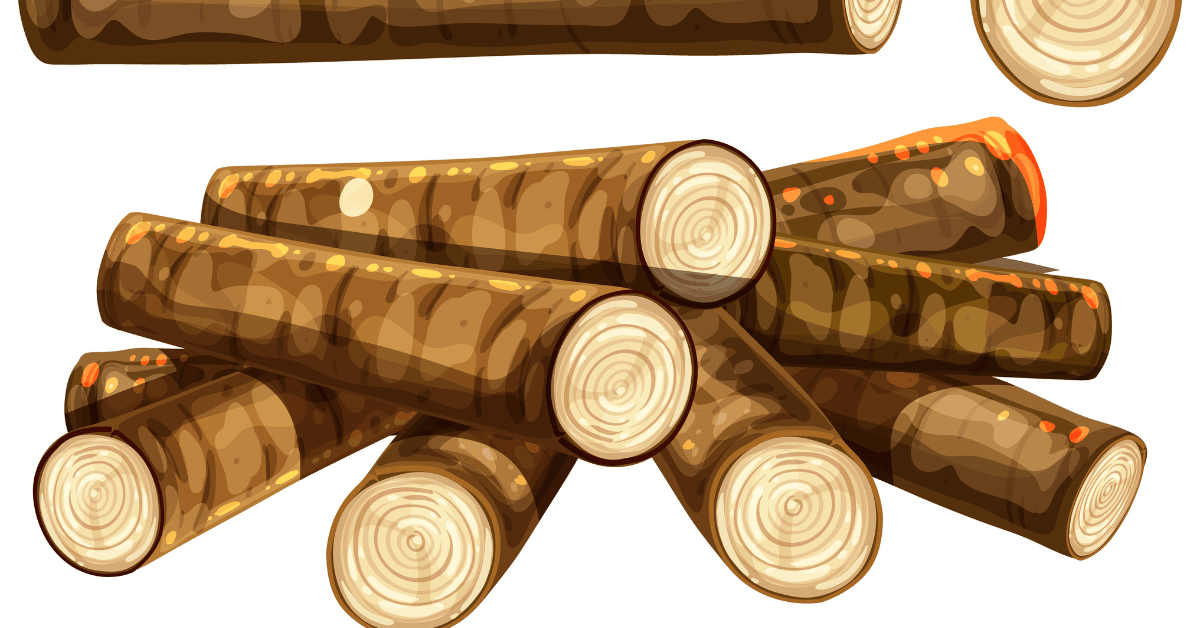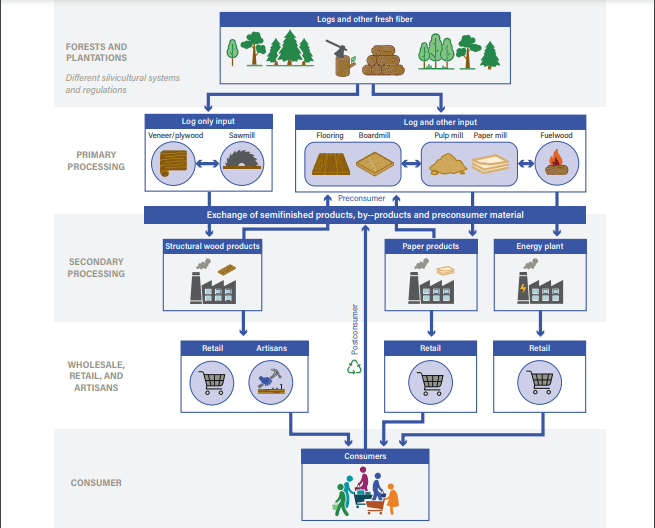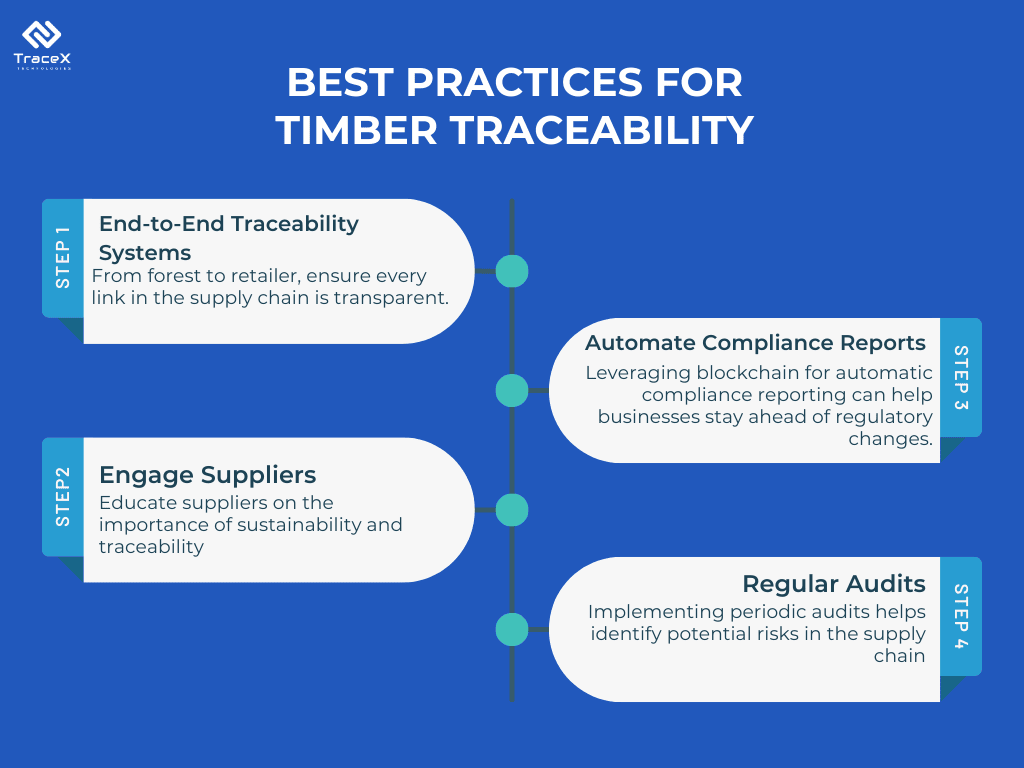Contact: +91 99725 24322 |
Menu
Menu
Quick summary: Learn how technology solutions can help your business ensure timber traceability for EUDR compliance. Discover the benefits of transparency, sustainability, and reduced risks in the timber industry.

With the European Union Deforestation Regulation (EUDR) coming into force, businesses dealing in timber and related products must comply with strict regulations aimed at eliminating deforestation-related goods from the EU market. ensuring sustainable sourcing of timber is not just an ethical choice—it’s a legal necessity This is where timber traceability solutions come into play.
Leveraging technologies like blockchain and digital monitoring, companies can streamline compliance efforts and mitigate risks associated with illegal logging and supply chain opacity. The EUDR aims to ensure that no product contributing to deforestation enters the European market, meaning businesses must prove that their timber sourcing practices are fully traceable and comply with sustainability standards. But the question remains: how can companies ensure transparency across complex, multi-tiered supply chains?
Key Takeaways
Forests are vital for biodiversity, water management, and serve as carbon sinks, while also providing food and raw materials for local communities and global supply chains. Timber and fiber are often the primary commodities harvested from forests, prompting many governments to create traceability systems to ensure that these materials adhere to relevant legislation.

To combat the trade of illegal timber, major consumer markets have enacted laws and regulations requiring due diligence to mitigate the risk of sourcing products made from unlawfully harvested wood. As the demand for legally sourced forest products rises, the importance of traceability in international markets has intensified. Effective risk assessment and mitigation in supply chains frequently depend on the robustness of traceability systems. Such systems can significantly enhance decision-making and forest resource management, helping to diminish illegal logging and deforestation and supporting global climate objectives. Additionally, traceability is crucial for the regulated trade of endangered species under the Convention on International Trade in Endangered Species of Wild Fauna and Flora (CITES), which necessitates heightened levels of monitoring.
It’s important to note that traceability does not equate to legality or sustainability. However, it fosters transparency and accountability within supply chains, serving as a critical first step toward achieving and demonstrating lawful and sustainable practices. While a traceable product may not inherently be legal or sustainable, producers and buyers with traceability systems are better equipped to assess the risk of illegal timber sourcing and to comply with legal requirements by tracking the product back to its origin.
An effectively designed traceability system can enhance credibility in international markets and prove that products meet the quality standards demanded by buyers. Numerous governments overseeing valuable forest resources are considering or already implementing traceability systems to strengthen legal compliance, ease exports to regulated markets, formalize their forestry sectors, or improve forest resource
Traceability in the timber industry refers to the ability to track timber through all stages of its life cycle—from the forest where it was harvested to the point of sale. This ensures that every step in the timber supply chain is transparent, legal, and sustainable. With the EUDR in effect, traceability becomes even more critical.
When addressing traceability for timber products, the fundamental inquiries are generally focused upstream:
▪ What species are included in the product?
▪ From where did the trees used for this product originate?
▪ Were the trees harvested and processed in accordance with relevant laws?
▪ Were the forests supplying these trees managed in a legal and/or sustainable way?
▪ How does the material move through the supply chain, and how are the outputs linked to inputs at every stage?
To effectively respond to these inquiries, both internal (e.g., tracking materials and products within a company’s operations) and external (e.g., tracking materials and products between different organizations) traceability processes are essential.
The significance of sustainability in the forestry sector is at an all-time high. Verifying and certifying the traceability of wood products across their supply chain instills confidence in buyers regarding their environmentally conscious raw material decisions and helps operators ensure sustainable practices.
A widely recognized certification is FSC, with over 150 million hectares of FSC-certified forests globally. The FSC certification and the traceability it mandates often coincide with effective information management and business integrity. Protecting forests and promoting traceable, sustainable practices in the timber industry serves everyone’s interests. The FSC certificate symbolizes dedication to responsible forestry and timber sourcing.
FSC certification ensures responsible forest management and sustainable raw material sourcing in the timber industry. It mandates that the Chain of Custody (CoC) remains intact from the forest to the final product. The demand for FSC-certified timber is on the rise, with many operators insisting on certification for sawn timber as evidence of transparent forest management, sourcing, and processing aligned with sustainable principles. In essence, an FSC label signifies commitment to forest protection, ecosystem conservation, and the rights of indigenous communities.
To reliably verify the complete information regarding wood origin throughout the supply chain, as required by the FSC certification, the data must traverse various steps and internal processes of the reporting entities. Given that current demand for FSC products surpasses available supply, the assortment of FSC-labeled products may include items made from controlled wood, not entirely composed of 100% FSC material. Beyond 100% FSC-certified products, the FSC label can also pertain to partially certified or recycled materials.
Technology solutions play a pivotal role in addressing the timber traceability challenges mentioned, particularly in industries where supply chains involve multiple stakeholders and processes.
Blockchain technology ensures data transparency and integrity by creating a decentralized, tamper-proof ledger for tracking timber from source to market. Each stakeholder along the supply chain, including sawmills and wood processors, can enter data that is verifiable and cannot be altered retroactively. This reduces the risks of data tampering and ensures that all certifications and material information, such as FSC standards, are maintained across different stages of the supply chain.
Internet of Things (IoT) devices and smart sensors can track environmental factors like humidity, temperature, and location of timber throughout its journey. These sensors provide real-time data, helping companies monitor wood quality and ensure compliance with safety and sustainability standards. IoT helps in gathering accurate data about material origins, reducing reliance on manual entries, and minimizing human error.
Modern ERP systems serve wood industry operators by enhancing sales tracking, providing insights into the proportion of sold and certified production batches, for example, monthly. Such systems allow for the verification of FSC-certified wood proportions in products and support the generation of reliable certification documentation in practice. Moreover, the automation of certification data collection can be tailored to individual operators or customers, thus optimizing business processes.
Cloud technology facilitates seamless communication and collaboration among different stakeholders by enabling real-time data sharing across geographies. With a cloud-based solution, every participant in the supply chain, from forest managers to sales, can access up-to-date certification information, ensuring compliance at every level.
By integrating these technologies, businesses can streamline timber traceability, eliminate data silos, and ensure that all stages of the process meet regulatory and certification standards, such as FSC or EUDR. This level of digital traceability ensures that the risks associated with manual processes—such as data loss or human error—are minimized, thereby enhancing transparency, compliance, and efficiency.

The TraceX EUDR Compliance platform is a robust, blockchain-based solution designed to help agribusinesses and timber companies comply with the EU Deforestation Regulation (EUDR). It enables seamless tracking and verification of products across the entire supply chain, ensuring transparency and sustainability. By leveraging blockchain, it provides immutable records of sourcing, processing, and distribution, guaranteeing that timber products meet deforestation-free requirements. Additionally, the platform integrates with existing systems, allowing businesses to manage due diligence, minimize risks, and maintain compliance with evolving regulations.
In an era where sustainability is synonymous with profitability, investing in robust timber traceability solutions is not just about complying with the EUDR—it’s about securing the future of your business. With the right technology solutions—like blockchain and IoT—companies can achieve transparency and sustainability throughout their supply chains. As EUDR regulations become more stringent, adopting traceability platforms not only ensures compliance but also fosters trust, reduces risk, and strengthens relationships with eco-conscious consumers and partners.
EUDR, or the EU Deforestation Regulation, aims to prevent deforestation by regulating commodities like timber that enter the EU market. Businesses must demonstrate traceability and prove their timber products are deforestation-free.
Blockchain ensures every step in the timber supply chain is transparent and immutable, allowing companies to track the origin and journey of timber in real time, ensuring it meets EUDR requirements.
Companies failing to comply with EUDR can face significant fines, loss of market access, and reputational damage, making compliance essential for continued business in the EU market.
